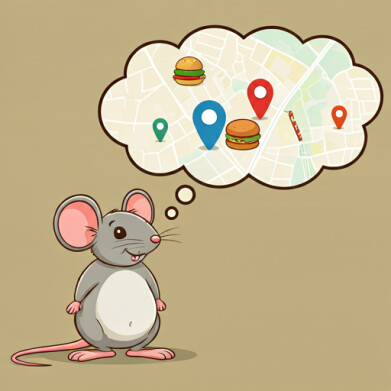Research news
Memory systems in the mouse brain found to drive food cravings that could influence weight gain
Jan 15 2025
Neurons in the hippocampus have been shown to encode memories of sugar and fat, shaping feeding behaviour and metabolic health in mouse models
Do memories influence what and how much we eat? A study a team at Monell Chemical Senses Center, University of Pennsylvania, has linked food memory to overeating, and resoundingly answered that question as: “Yes!”
Led by Dr Guillaume de Lartigue, the researchers have identified the brain’s food-specific memory system and its direct role in overeating and diet-induced obesity.
Published in Nature Metabolism, they describe a specific population of neurons in the mouse brain that encode memories for sugar and fat, profoundly impacting food intake and body weight.
“We are bombarded [these days] with so many environmental triggers designed to remind us of pleasurable food experiences,” said Dr. de Lartigue.
“What’s [been] surprising is that we’ve now pinpointed a specific population of neurons in the hippocampus that forms these food-related memories and [importantly] drives our [future] eating behaviour.
“These connections could have significant implications for body weight and metabolic health,” he added.
The neurons encode memories of the spatial location in the real world of nutrient-rich foods ─ acting as a ‘memory trace’ ─ but particularly for sugar and fat. Silencing these neurons impaired an animal’s ability to recall sugar-related memories and so reduces its sugar consumption. This prevents weight gain even when the animals are exposed to diets that [usually] contribute to excessive weight gain and obesity.
Conversely, reactivating these neurons enhances memory for food, increasing consumption and demonstrating how food memories influence dietary behaviour.
These findings introduce two new concepts:
- Evidence that specific neurons in the brain store food-related memories.
- Memories directly impact food intake.
“While it’s no surprise that we remember pleasurable food experiences, it was long assumed that these memories had little to no impact on eating behaviour,” said Dr. de Lartigue.
“What’s most surprising is that inhibition of these neurons prevents weight gain, even in response to diets rich in fat and sugar,” he added.
What sets this discovery apart from other studies related to memory is its implications for understanding metabolic health. Deleting sugar-responsive neurons in the hippocampus of the animals not only disrupts memory but also reduces sugar intake and protects against weight gain or obesity, even when animals are exposed to high-sugar diets.
This highlights a direct link between certain brain circuits involved in memory and metabolic health, which has been largely overlooked in the field of obesity research.
“Memory systems in the hippocampus evolved to help animals locate and remember food sources critical for survival,” said Mingxin Yang, first author of the study and doctoral candidate at the University of Pennsylvania.
“In modern environments, where food is abundant and cues are everywhere, these memory circuits may drive overeating, contributing to obesity,” she said.
Another key discovery was that food-related memories are highly specific. Sugar-responsive neurons encode and influence only sugar-related memories and intake. Likewise for fat-responsive neurons only impacting on intake of fats. Neither do these neurons affect other types of memory, such as spatial memory for non-food-related tasks.
“The specificity of these circuits is fascinating,” said de Lartigue. “It underscores how finely tuned the brain is for linking food to behaviour, ensuring animals can differentiate between various nutrient sources in their environment.
Separate systems have presumably evolved because foods in nature rarely contain both fat and sugar, the authors have surmised.
The study’s findings open new possibilities for addressing overeating and obesity. By targeting hippocampal memory circuits, it may be possible to disrupt the memory triggers that drive consumption of unhealthy, calorie-dense foods.
For further reading please visit: 10.1038/s42255-024-01194-6
— Additional reporting by Alan Booth
Digital Edition
ILM 50.2 March 2025
March 2025
Chromatography Articles - Effects of small deviations in flow rate on GPC/SEC results Mass Spectrometry & Spectroscopy Articles - Waiting for the present to catch up to the future: A bette...
View all digital editions
Events
Mar 27 2025 New Delhi, India
Mar 31 2025 Beijing, China
Microbiology Society Annual Conference 2025
Mar 31 2025 Liverpool, UK
Apr 01 2025 New York, USA
Apr 02 2025 Saigon, Vietnam




















